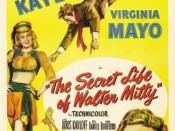Sigmund Freud, while developing psychoanalysis, identified the three components of the human psyche; the id, ego and superego. The id being the pleasure seeking part of the psyche, the ego being the reality principle and the superego as the moral principle. Author's H. G. Wells and James Thurber use the three components of the psyche to develop their fictional characters. H. G. Wells' The Door in the Wall highlights a characters search for balance in his psyche. Lionel Wallace is a confused man searching for an escape from the dreariness of everyday life. Similarly Walter Mitty, the main character from James Thurber's The Secret Life of Walter Mitty, is searching for balance between his fantasy world and the reality he attempts to drive away. Through the development of each characters id, ego and superego the two authors depict men whom search for their ideal world. H. G. Wells and James Thurber illustrate the psyches' power by developing characters that have imbalanced psyches', which ultimately cause them to reject reality and flee to fantasy.
Lionel Wallace and Walter Mitty each have a superego, which attempts to prevent their id from controlling them. Lionel Wallace is often found at a crossroad in his journey. Many times he finds the door to his utopia after his initial entry, however he fails to enter. Wallace's second experience with the door "æmarks the world of difference there is between the busy life of a schoolboy and the infinite leisure of a child"æthis second time [he] didn't for a moment think of going in straight away"æ for one thing [his] mind was full of the idea of getting to school on time-set on not breaking [his] record for punctuality (108).
Wallace's superego prevents him from fulfilling his desire to go into the door by maintaining his morals that it is wrong to be late for school. His third encounter with the door acts on the same premise. Lionel is seventeen years old and "it leaped upon [him] for the third time-as [he] was driving to Paddington on [his] way to Oxford and a scholarship"à(107). Again he is unable to enter based on his morals enforced by his superego. Wallace must let the door go on this occasion because he must get to Oxford and receive his scholarship; not doing so would be unwise. As such Wallace's superego battles with his id to maintain a moral reality for him. Walter Mitty's psyche works in the same fashion. Mitty's superego is in constant opposition of his id. Following the conclusion of Walters first fantasy "he looked at his wife"æwith shocked astonishment"à(88). He is confused about his surroundings that have been suppressed by his fantasy. Walter's superego pulls him out of his dream and leaves him in a reality he has no grasp on. He, like Wallace, has trouble suppressing his desire for a utopian world and therefore has a superego and id that are in opposition. However each character also has an ego, which disagrees with the other parts of their psyche.
The egos of both Walter Mitty and Lionel Wallace seek reality in order to subside their id. Walter Mitty envisions a world in which he is in a situation to be courageous. The fantasies however, end before he ever is courageous. In his first fantasy about being a pilot in the war peers say, ""à[he] ain't afraid of Hell!'"àand the fantasy then ends (88). Walter returns to reality because his ego reminds him that in reality he does not have the courage to finish his fantasy. Mitty's ego continues to interrupt his fantasy life while Walter is shopping, "[He] began to wonder what the other thing was his wife told him to get"à(90). As he is attempting to remember Walter's id takes over momentarily and he envisions himself as just having confessed in a murder trial. This is where the dream ends and Walter remembers "puppy biscuits"àare what he was sent for (91). Walter is again dragged away from dreams caused by his id because his ego reminds him he is not courageous enough to face the consequences of murder and he is shopping for puppy food. Lionel Wallace is also forced back into reality by his ego. Wallace enters the garden and finds everything he wants, as a result of his id seeking pleasure. A stern woman then appears and takes Wallace away from his utopia. This woman then shows him of a book of his life that was ""æbut a harsh reality; that enchanted place and the restraining hand of the grave mother at whose knee [he] stood had gone"à(102). The grave woman Wallace met leaving the garden is a direct representation of his ego. The stern woman described as grave reminds him that his mother has died and is in her grave. Wallace and Mitty's ego combat their id in hopes of maintaining a sense of reality. Unfortunately the id is too strong for the ego and superego causing the two characters demise.
Lionel Wallace and Walter Mitty succumb to their id, which ultimately causes their rejection of reality. Lionel Wallace finds a utopia after years of emotional trouble due to his id. His childhood was difficult as "his mother died when he was 2"æhis father was a stern, preoccupied lawyer, who gave him little attention"à(98). As a result his id gave him an escape that was ""æ a keen sense of homecoming in [his] mind"à(100). Lionel also gained a temporary mother figure in the form of ""æa tall, fair girl [who] appeared in the pathway and came [him] smiling"æand lifted [him] and kissed [him] and put [him] down and led [him] by the hand"æ"à(100). The woman represents Wallace's desire to have a mother figure. His id provides him with a release from his dreary life. It also eventually causes him to die as he rejects reality. After searching for the door to his ideal world "they found his body "æ in a deep excavation"æin which a small doorway has been cut"æ"à(111). Wallace is driven to find pleasure by his id, which causes him to crawl into a dangerous area and die. Had he not seen searching for his utopia he never would have entered the door. Lionel Wallace ""æmanages at first to reject the allurements of the vision, but ultimately he succumbs"à(Borrello 73). Walter Mitty's id also controls him so much that he is willing to die for it. Walter experiences id driven fantasies in hopes of forgetting his everyday woes. While on his way to go shopping " he drove around the streets aimlessly for a time, and then drove past the hospital on his way to the parking lot"à(89). At this point Walter experiences a fantasy in which he is a world-renowned surgeon and is saving a man's life. Walter's id triggers a fantasy in hopes of creating a more interesting world for him. Walter's final fantasy involves him being executed as "with a faint smile playing about his lips he faced the firing squad"à(93). The final fantasy of Walter Mitty shows his ego and superego that he does not need reality. He has the courage to stand up to a firing squad "In this way the story "æencloses Mitty within the world of his dreams"à(Long 65). As a result Walter no longer needs reality. Similar to how Wallace no longer needs reality because he is dead.
The characters of H. G. Wells (Lionel Wallace) and James Thurber (Walter Mitty) have a psyche in which the strength of the id eventually suppresses the ego and superego causing the characters to reject reality and flee to fantasy. Lionel Wallace's id battles with his ego and superego and the id ultimately prevails. Although his ego and superego suppress the id for a time as seen when he did not enter the door on every occasion he saw it. The id overcame the superego and ego eventually causing Wallace's death as he attempted to flee reality and find fantasy in an excavation site door. Walter Mitty also flees reality to a dream world. Times when Walter is living a less then glamorous life his id takes control and gives him a fantasy world. Many times Mitty's ego and superego overcame his id, telling him he should not be dreaming or he is not courageous enough to finish his fantasies. However, as in the case of Lionel Wallace, Mitty's id survives and in his final fantasy proves he is courageous and thereby brings him fully into a fantasy world. If the two characters had a balanced psyche would their fates have changed? Absolutely. Lionel Wallace would have never followed his id and crawled into the door that led to his death. Walter Mitty also, would have never rejected his reality had his id not prevailed over his psyche. The imbalance of the three components of each characters psyche caused their demise, leaving them in a fantasy world forever.
Works Cited Borrello, Alfred. H. G. Wells: Author in Agony. United States of America: Southern Illinois University Press, 1972.
Long, Robert Emmet. James Thurber. New York: The Continuum Publishing Company, 1988





